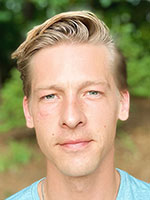 As the new editor of the Catholic News Herald, I would like to briefly introduce myself to all of you loyal readers.
As the new editor of the Catholic News Herald, I would like to briefly introduce myself to all of you loyal readers.
I am honored to have been chosen for this position. In fact, when I was maybe 7 or 8 years old, I told my mother during religion class (my brother, sister and I were homeschooled) that, “One day, maybe I could be a reporter or editor of the Catholic News Herald. That way I can write stories and serve God.” My mother laughed lovingly but dismissively at the comment, as all good mothers should, redirecting me from daydreaming back to the schoolwork at hand.
My parents encouraged me to read and write, shaping what would become my career as a fiction writer and poet, and now as editor of the Catholic News Herald.
First and foremost, I am husband to my beautiful wife Amanda and father to our 3-year-old son Leo. I received all of my first sacraments at Good Shepherd Mission in King, where I grew up, and I was confirmed by Bishop Peter Jugis. That parish is still very dear to my heart.
When I was in elementary school, I became pen pals with then Bishop William Curlin. Several times a month I would update the bishop on my schoolwork, drum lessons and altar server training, all the while asking questions about his life and missionary work with Mother Teresa. The bishop wrote back to every letter I sent, and we continued our correspondence until his retirement.
My wife and I were married in 2018 at Our Lady of Grace Church in Greensboro by Father Christian Cook. Before joining the Catholic News Herald, I taught literature and writing at St. Leo the Great School in Winston-Salem.
I attended Ave Maria University in Florida and Salem College in Winston-Salem, and have a degree in literature and creative writing. I have more than 10 years of experience as a journalist, editor and professional author.
The mission of the Catholic News Herald, and now my mission, is: “Serving Christ and connecting Catholics in western North Carolina.” I hope to serve the people of this diverse diocese well, and I promise I will work hard to do just that. Prayer has been at the root of my life and will continue to be at the root of this publication.
I know you are devoted to our Church and to the communities you serve. I hope to serve you well in this new calling of mine, and all of us at the Catholic News Herald ask for your prayers. May Our Lord bless you all and keep you forever in His grace.
If you ever have questions or comments, please feel free to reach out: This email address is being protected from spambots. You need JavaScript enabled to view it. or 704-808-4528.
— Spencer K. M. Brown
Pennybyrn retirement community celebrates diamond anniversary
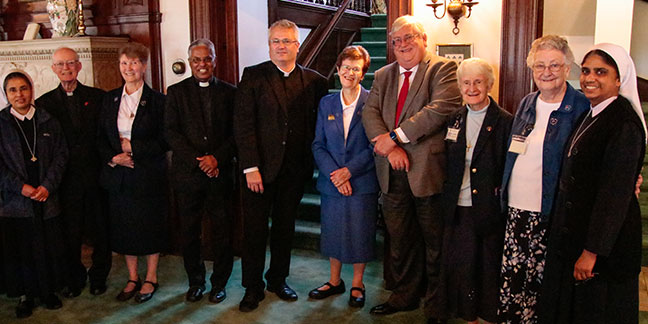 HIGH POINT — Born from a spirit of gratitude, Pennybyrn retirement community celebrated its 75th anniversary Nov. 7 with Mass followed by a brunch. Presided over by Monsignor Patrick Winslow, vicar general and chancellor of the Diocese of Charlotte, the Mass was attended by concelebrating clergy, residents, consecrated religious and a small choir.
HIGH POINT — Born from a spirit of gratitude, Pennybyrn retirement community celebrated its 75th anniversary Nov. 7 with Mass followed by a brunch. Presided over by Monsignor Patrick Winslow, vicar general and chancellor of the Diocese of Charlotte, the Mass was attended by concelebrating clergy, residents, consecrated religious and a small choir.
Grateful to U.S. soldiers who protected the United Kingdom during World War II, the sisters of the Poor Servants of the Mother of God were inspired to serve in the United States. They arrived in High Point from London on Nov. 15, 1947, to build a hospital. Providence led them to start a convalescent center instead, and that ministry has grown exponentially over the years.
“It’s an incredible privilege to be here at this time and to think that this place has continued for all these decades,” said Sister Lucy Hennessy, mission leader and chair of the board of directors at Pennybyrn. “The sisters who came here prior to me put down very deep roots, faith, and hope.”
Recognizing a lasting legacy
In his homily, Monsignor Winslow commented on the beautiful weather for the day’s celebration. “Yet it seems as though Sister Lucy could make the sun shine even if the rest of High Point is under a cloud,” he said, endearing himself to the congregation who clearly had a deep love for Sister Lucy and the other Servants of the Mother of God: Sisters Mona Comaskey, Gabriella Hogan and Loretta O’Connor, who each provide pastoral care to the residents.
On a more serious note, Monsignor Winslow turned to the topic of combating evil, which he said begins in the heart, not somewhere out in the world.
“An antidote maybe not necessarily seen as fighting evil but truly, truly is – is the love and the faith and the conviction of these religious women who have come to serve the people here. Because they are reaching out, as they reach these ages, they understand where it all starts and where it all ends,” he said.
The sisters’ work has grown into a 71-acre Life Plan Community with 450 residents and 460 staff members. In July, the Poor Servants of the Mother of God
announced that they will be turning Catholic sponsorship of Pennybyrn over to the Diocese of Charlotte with local management and ownership remaining the same.
Sister Lucy explains: “‘Demonstrating God’s love for the lives we touch’ is our mission. That’s key, and the staff knows it, too – at least enough to say the mission, but they hopefully know it in their fingertips! The staff members have a great spirit. They really do. I am called the mission leader, but I tell them we are all mission leaders.”
Spiritual sustenance
Also on campus is a Perpetual Eucharistic Adoration Chapel, where roughly 100 people from neighboring parishes have taken turns (except during the pandemic) keeping vigil every day and night since the Feast of Corpus Christi on June 5, 1994.
Longtime Pennybyrn residents Ken and Sally Hughes, who helped plan and fund the Adoration Chapel, attended the anniversary Mass. The couple moved to High Point in 1968, two miles from Pennybyrn, and have been involved with the community and the sisters ever since.
“It’s a joy for the sisters to have been here this long,” said Ken Hughes. It’s a great place to be. I would have not chosen anyplace else other than here.”
The Adoration Chapel and Mass in the main chapel have been great sources of spiritual fortification for the sisters, residents, staff members and the wider community.
These fonts of spiritual renewal complement the pastoral care of the sisters as they care for residents and their families in a gentle manner.
“The sisters enjoy a very strong prayer life here,” added Sister Lucy. “It is a retirement center, but it’s also very much a prayer center as well. That fits very well into living out my religious life. The rhythm of the prayers is as important as the rhythm of the service that we render here.”
In a statement, Bishop Peter Jugis thanked God for the sisters’ seven decades of service and compassionate care. “Jesus Christ is at the center of the consecrated religious life. The sisters of the Poor Servants of the Mother of God brought the Lord with them to High Point and the Triad by the witness of their lives as consecrated religious,” he said. “They created a Christ-centered ministry of care for the sick, following the example of Jesus who loved the sick and cured them.”
— Annie Ferguson. Photos by Paul Campbell
Pennybyrn’s 75-year legacy of care
Seventy-five years ago, five sisters of the Poor Servants of the Mother of God were sent by their London congregation to High Point at the request of North Carolina Bishop Vincent Waters. Inspired to open a hospital in the U.S. because of the kindness shown to them by American soldiers in Europe during World War II, the sisters left everything that was familiar to them to serve God in North Carolina. They arrived Nov. 15, 1947.
Before leaving, the pioneers – Sisters Mary Patrice, Anne Christina, Maria Benignus, Ellen Fitzgerald and Mary Monica – learned they would have nowhere to live due to a limit on funds permitted to leave their home country after the war.
Knowing the Lord would provide, they embarked on the journey anyway. The pastor of the newly established Immaculate Heart of Mary Parish in High Point helped secure a home for the sisters: Penny House, originally built by State Sen. George Penny in 1927, on Greensboro Road in High Point. Later, Penny gifted the house to the sisters, and it has served as their convent ever since.
Realizing the home was larger than what they needed to live, the sisters converted the first floor of the building into a convalescent center with 22 beds and they lived in a guest house. The center became known as Maryfield after it was licensed as a nursing home in the 1950s. It moved to a separate building behind the house in 1965. The sisters remained in Penny House and still live there today.
The Poor Servants of the Mother of God continue in the tradition of their foundress, Mother Magdalen, caring for their residents with the guidance of a board of directors and ambassador council comprised of people from the community. Their mission: to share God’s love by nursing the sick and comforting the dying.
Home in America
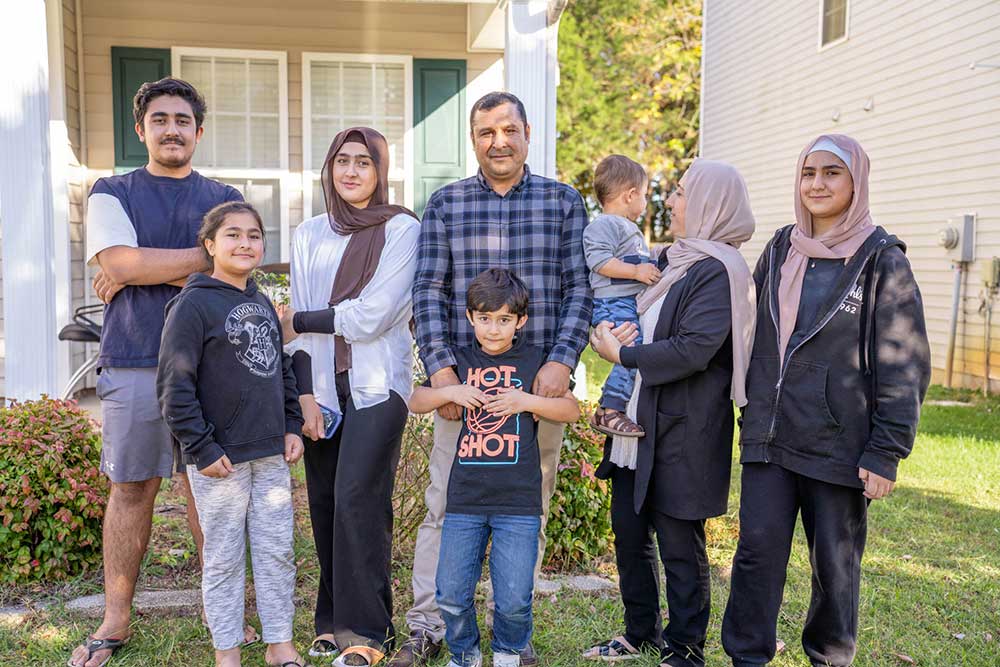 Mohammad and his family have settled into a new home in Charlotte, thanks to help from Catholic Charities and other organizations, and they are pursuing asylum status to remain here permanently. He and his wife are relieved their children are all back in school, and their eldest son is thinking about college. (Photos by Alex Cason | Catholic News Herald)CHARLOTTE — A year after 250 people were evacuated from Afghanistan to Charlotte and Asheville, a new phase of their resettlement is under way as Catholic Charities helps guide them through the complex process of securing a long-term home in the United States.
Mohammad and his family have settled into a new home in Charlotte, thanks to help from Catholic Charities and other organizations, and they are pursuing asylum status to remain here permanently. He and his wife are relieved their children are all back in school, and their eldest son is thinking about college. (Photos by Alex Cason | Catholic News Herald)CHARLOTTE — A year after 250 people were evacuated from Afghanistan to Charlotte and Asheville, a new phase of their resettlement is under way as Catholic Charities helps guide them through the complex process of securing a long-term home in the United States.
All of the families evacuated to western North Carolina through Catholic Charities now have housing, jobs and income to support themselves – with children in school, access to medical care and networks of assistance. The refugees’ focus now is on reuniting with family left behind and on traveling to Washington, D.C., for immigration interviews that will determine their futures.
Mohammad’s family is among them. A year ago, he and his wife huddled with their six children on the streets outside the Kabul airport, desperate to flee as the Taliban regime took over control of Afghanistan. Mohammad dreamed of a safe place to raise his family, where his three daughters could attend school without fear of gunfire and bombings, where his oldest son could seek higher education and his younger sons would also have brighter futures.
After a grueling evacuation in which his family was shuttled first to Qatar, then a U.S. military base, and finally to North Carolina, Mohammad said he is grateful.
“We’re thankful to Catholic Charities and to the whole nation for the opportunity to be here,” said Mohammad (identified by his first name for security reasons).
“We’re thankful to be safe and glad for the opportunity to live a normal life.”
Upon the evacuees’ arrival in Charlotte, Catholic Charities provided several months of intense resettlement services – finding housing, securing medical care, and placing them in jobs and schools. Now, caseworkers for the agency’s resettlement office are shuttling families to Washington for immigration interviews and assisting with other needs – as they also support new additional refugees from Ukraine and other war-torn places around the world.
“The Afghan evacuees are adjusting really well,” said Laura Jones, Catholic Charities Diocese of Charlotte’s resettlement director. “If you think about where they were a year ago, chasing planes on the tarmac to flee their country, few could have imagined the stable lives they’d be leading in a matter of months.”
Over the past year, Jones said: “We’ve seen babies born and young people start college. We’ve seen a number of reunifications, where family left behind were able to join their loved ones in Charlotte. And almost all of the Afghan families are staying here – we’ve seen very little out-migration, which is not the case in other areas.”
Since October 2021, Catholic Charities has resettled 252 Afghan evacuees in Charlotte and Asheville, as well as 132 additional refugees from more than a dozen countries. More recently, the agency has provided services for 129 Ukrainian refugees arriving in the Charlotte diocese as “sponsored arrivals” of the government’s
“United for Ukraine” program, following Russia’s attacks on the country that began in March.
The Catholic Church is one of the nation’s largest refugee resettlement agencies. In partnership with dioceses across the country, the Church through the U.S.
Conference of Catholic Bishops resettles approximately 18 percent of the refugees who arrive in the U.S. each year.
“It is the mission of the Church and the Charlotte diocese to welcome the stranger as we are guided to do by Scripture,” Jones said. “Right now that means a Herculean effort by Catholic Charities to help our Afghan evacuees through the immigration process. We’re committed to helping every Afghan win asylum and establish new lives in this country.”
STARTING OVER IN CHARLOTTE
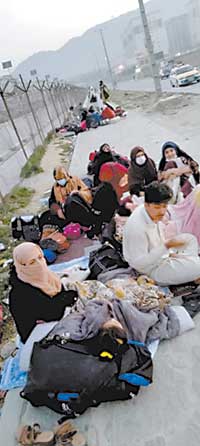 Mohammad and his family spent two nights waiting outside the gates of the Kabul airport in August 2021, desperate to escape the increasing threat from the Taliban. (Photo provided)Mohammad, whose strong English-language skill has opened opportunities, worked a variety of jobs in Afghanistan – from assisting U.S. efforts to build infrastructure and communities to operating a shop selling perfume and cosmetics.
Mohammad and his family spent two nights waiting outside the gates of the Kabul airport in August 2021, desperate to escape the increasing threat from the Taliban. (Photo provided)Mohammad, whose strong English-language skill has opened opportunities, worked a variety of jobs in Afghanistan – from assisting U.S. efforts to build infrastructure and communities to operating a shop selling perfume and cosmetics.
Life grew chaotic in 2019 as violence began to threaten his family’s safety, so he pulled his daughters out of school and kept everyone closer to home. Mohammad and his wife, whom he says he consults on everything, knew the family wouldn’t be safe after U.S. forces suddenly withdrew from the country in August 2021 and the Taliban took control.
So, with few belongings and with their 5-month-old baby and five other children in tow, the couple raced to the Kabul airport to flee. There was gunfire and huge crowds in the streets as they made their way. They spent two nights waiting outside the airport gates, keeping to themselves, fearful the Taliban would arrive to confront them.
Mohammad and his family were among the lucky ones. Their names were called, they boarded a flight out, and they left their homeland behind. After a brief stay in Qatar, the family flew to Fort McCoy in Wisconsin, where they lived for three months in a dormitory with five other families.
In late November, Mohammad and his family were relocated to a hotel in Charlotte – and three weeks later they moved into their own home, a rented house in the suburban Highland Creek neighborhood. A number of organizations have rallied around his family, including The Independence Fund and the Allies program.
Now, Mohammad works as a human resources recruiter for a bridge and highway building company. He has his own car and his wife is studying for her driver’s license test. She is looking for a job as a tailor. The couple is relieved their children are all back in school, and their eldest son is thinking about college and a career in engineering.
“The kids are doing well,” Mohammad says. “They are learning every day, getting better with the language, and doing better every day.”
A PATH TO CITIZENSHIP
With all the Afghan evacuees settled into new lives in North Carolina, Catholic Charities has shifted to helping navigate their path to long-term residency and possibly citizenship.
Evacuees were granted temporary status to remain in the country upon arriving, and the federal government has since extended that to two years. During that time, evacuees must apply for asylum, then a green card. Five years after that, they can seek permanent citizenship.
Catholic Charities’ resettlement office has a network of attorneys helping these families navigate this process. Case coordinators and volunteers are driving families to Arlington, Va., near Washington, for government interviews about their lives and activities in Afghanistan. So far, 25 evacuees have secured status changes and by the end of October, 160 of their Afghans clients will have completed an asylum interview.
Once Mohammad’s family is granted asylum, his son can apply for college and financial assistance.
Yet their worries aren’t completely behind them yet. Mohammad is also focused on reuniting with several family members still in Afghanistan – including his mother and a brother.
WELCOMING THE STRANGER
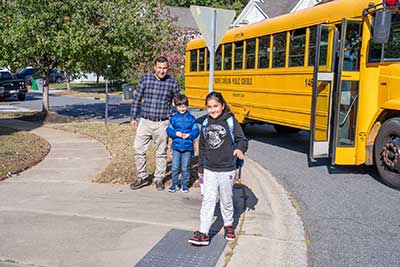 Emergency evacuees like the Afghans and other refugees are often victims of war, political upheaval and religious, economic or ethnic persecution. Many are forced to leave their homes, jobs and families simply to stay alive. They pay taxes in the U.S. and repay the government their travel expenses on their way to establishing new lives.
Emergency evacuees like the Afghans and other refugees are often victims of war, political upheaval and religious, economic or ethnic persecution. Many are forced to leave their homes, jobs and families simply to stay alive. They pay taxes in the U.S. and repay the government their travel expenses on their way to establishing new lives.
The Biden administration recently announced it would welcome up to 125,000 refugees in fiscal year 2023, which began Oct. 1. A similar number was expected last fiscal year, but U.S. State Department figures show just 25,465 refugees were resettled nationally – a pipeline slowed by the pandemic and a more limited approach to immigration during the previous administration.
The U.S. Conference of Catholic Bishops has said it remains committed to the Church’s long tradition of welcoming immigrants fleeing war, violence, natural disasters, political instability and persecution.
Auxiliary Bishop Mario E. Dorsonville of Washington, chairman of the USCCB’s Committee on Migration, said recently that as the number of refugees returns to higher levels, the conference will continue to “embrace this ministry given to us by Jesus,” and that “we look to the president and Congress for their continued support of a robust resettlement program, consistent with our national values.”
With financial assistance from the U.S. bishops, Catholic Charities accompanies refugees for up to five years, providing housing, health care, schools, community and cultural orientation, and budgeting and financial education. They also offer employment assistance, driver’s education, interpretation services and transportation to initial appointments.
Looking ahead, diocesan resettlement director Jones expects her office to help settle 315 more refugees in Charlotte this fiscal year, and 120 in Asheville.
As just one immigrant making a new life in Charlotte, Mohammad said he is committed to contributing positively.
“We are in a good situation. We are safe now, and we have the opportunity to work and to live without the tension of war,” he said. “We appreciate everything the U.S. has done for us. I need to thank the whole nation and the U.S. government for giving us this opportunity. Now, I just want work hard, support my family and my community and my country.”
— Kimberly Bender. Catholic News Service contributed
How can you help?
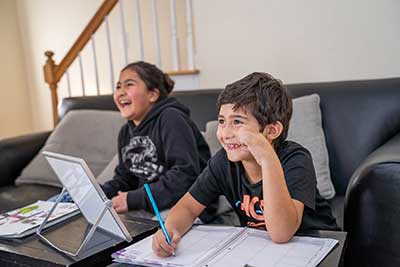 At www.ccdoc.org: Find out how to volunteer or donate to help the Refugee Resettlement Offices in Charlotte and Asheville welcome refugees. Financial contributions are welcome. Currently, new and gently used coats of all sizes are needed.
At www.ccdoc.org: Find out how to volunteer or donate to help the Refugee Resettlement Offices in Charlotte and Asheville welcome refugees. Financial contributions are welcome. Currently, new and gently used coats of all sizes are needed.
By the numbers
As partners in state and federal programs, Catholic Charities Diocese of Charlotte provides a variety of resettlement services for refugees from around the world. More than 14,000 refugees have been resettled in western North Carolina since the program began in 1975.
252: Afghan evacuees settled in Charlotte and Asheville since October 2021 – nearly all settled over three months last fall as part of an emergency federal program
132: Refugees settled in Charlotte and Asheville under the regular federal program since October 2021. From: Afghanistan, Burma, Congo, El Salvador, Honduras, Iraq, Moldova, Somalia, Sudan, Syria and Ukraine
129: Ukrainian refugees assisted in the diocese since March 2022
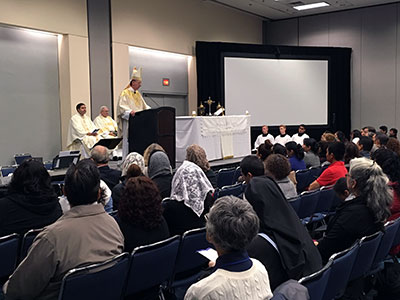 File photoHICKORY — Catechists and all who teach the faith are invited to attend the Diocesan Catechetical Conference at the Hickory Metro Convention Center Nov. 5. To coincide with the 50th anniversary of the Charlotte diocese, the conference theme is “Faith More Precious Than Gold.”
File photoHICKORY — Catechists and all who teach the faith are invited to attend the Diocesan Catechetical Conference at the Hickory Metro Convention Center Nov. 5. To coincide with the 50th anniversary of the Charlotte diocese, the conference theme is “Faith More Precious Than Gold.”
Held for the first time since 2019, the one-day event starts at 8 a.m. and ends at 4 p.m. Bishop Peter Jugis will celebrate Mass at 9:15 a.m. followed by the keynote presentation – “Eucharistic Faith: Foundation of Christian Identity” – by John Bergsma, Ph.D., a professor of theology at Franciscan University of Steubenville. Three breakout sessions featuring a variety of topics will follow Dr. Bergsma’s presentation.
Major publishing vendors, such as the Augustine Institute, Our Sunday Visitor, St. Paul Center for Biblical Theology and Sophia Institute Press will display and sell catechetical materials.
“The biggest draw for attendees is that we’re bringing in catechists and parish catechetical leaders from all over the diocese,” says Chris Beal, director of Faith Formation for the diocese. “It gives them an opportunity not only to hear great dynamic speakers both nationally and locally but also to come together and learn from one another.”
The third breakout session will include group sharing about best practices, practical takeaways, challenges and successes in the classrooms and beyond. In this session, parishes that have similar-size faith formation programs will meet and discuss these topics, drawing on the community, Beal says.
Beal also notes that in recent years roughly half of the 500 to 600 attendees are part of Hispanic Ministry in their parishes. Because of this, he says, the Spanish-language track is strong and features a keynote presentation from Father Julio Domínguez, the diocese’s Vicar for Hispanic Ministry.
Other talks include “Engaging Parents & Families in Catechesis” by Dr. Joseph White, “A Pastoral Response to Gender Ideology” by Theresa Farnan, Ph.D., and
“Catholic Philosophy: A Defense Against Relativism” by Paul Kotlowski. “Los Movimientos Apostólicos” by Father Domínguez, and “Formación Continua” by
Deacon Eduardo Bernal, and “Espiritualidad Cotidiana” by Ibis Centeno round out the Spanish track. Many other topics will be covered, including social media and communication for evangelization.
Conference check-in begins at 8 a.m., and the last breakout session ends at 4 p.m. For more information and to register, visit www.charlottediocese.org/ev/conference
Questions? Call the Education Vicariate office at 704-370-3244.
— Annie Ferguson
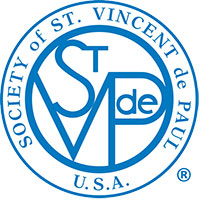 ARDEN — Devoted to the Church and the poor, the late Catherine Holzworth designated in her will that nearly $78,000 be given to the Society of St. Vincent de Paul – a charitable organization that follows in the footsteps of the French saint known for his compassion for the poor.
ARDEN — Devoted to the Church and the poor, the late Catherine Holzworth designated in her will that nearly $78,000 be given to the Society of St. Vincent de Paul – a charitable organization that follows in the footsteps of the French saint known for his compassion for the poor.
Holzworth, a member of St. Barnabas Parish in Arden, passed away aged 83 on Dec. 27, 2020. As a student at St. Mary’s College in Notre Dame, Ind., she felt called to a religious vocation and became a Sister of the Holy Cross. Holzworth was a member of the order for 13 years until she left over concerns that there would not be enough money to support her retirement there or in any other order given the overall funding issues at the time.
Leaving the order wasn’t an easy decision.
“Being a religious sister meant a lot to Catherine,” said Mary Unterborn of Dayton, Tenn., Holzworth’s youngest sister and executor of her estate. “She read everything she could about Mother Teresa and her mission to serve the poor. She was Catherine’s inspiration.”
Holzworth moved to Montana, married and lived there for 30 years. Throughout her life, her love for the Lord and His Church never wavered. After her husband passed away, she retired to North Carolina. Holzworth remained active in the Church, working at St. Barnabas and teaching confirmation classes.
“Our parents also supported the Society of St. Vincent de Paul,” Unterborn said. “Giving to a charity that serves our communities in this way was a natural choice for Catherine. The good to come from her donation would bring her so much joy.”
The gift was split between three conferences of the Society of St. Vincent de Paul: 50 percent went to the St. Barnabas Conference in Arden, 25 percent went to the St. Eugene-St. Lawrence-St. Joan of Arc Conference in Asheville, and another 25 percent went to the St. Margaret Mary Conference in Swannanoa.
“With the way the estate was drawn up, there was a problem with the wording. It was left to St. Vincent de Paul, Asheville, which is an entity that doesn’t technically exist, and Catherine may not have been aware of how it was made out,” explained Jim Loosemore, president of the Arden conference of the Society of St. Vincent de Paul.
The estate attorney contacted the Diocese of Charlotte to ask how it addresses this type of situation.
“Our office was able to organize meetings and discussions between all the parties – the leadership of the three conferences, the estate attorney and Catherine’s sister. We came up with a solution that all parties supported. We all wanted to make sure Catherine’s wishes were honored,” said Jim Kelley, development director for the diocese. “Like all those who leave an estate gift to the Church, Catherine’s gift will change lives. She is one of over 1,500 people we have worked with who either have or will leave a gift to the Church in their estate plans.”
The Arden conference’s clientele is split evenly between Buncombe and Henderson counties, helping with utilities, rent, mortgage and food.
“We are very grateful for the money from the estate. It came at a perfect time. The food pantry is taking up a lot of our funds. With the increase in food prices and inability to receive goods from the food banks, all the sources are drying up,” said Loosemore. “Because of the COVID issues, there are a lot of people pushed into situations they never expected. They don’t know who to call first, and we help them with that. The other conferences do the same.”
With this gift, Holzworth’s legacy lives on as the fruits of her labor continue to help those in need.
— Annie Ferguson












